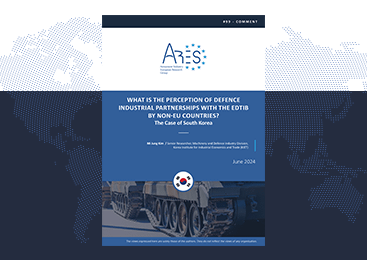
[Comment] What Is the Perception of Defence Industrial Partnerships with the EDTIB by Non-EU Countries? The Case of South Korea
By Mi Jung Kim, Senior Researcher, Machinery and Defence Industry Division, Korea Institute for Industrial Economics and Trade (KIET)
This comment focuses on South Korea which has one of the most efficient EDTIBs worldwide and is increasingly cooperating with Europe. It is part of a series tackling the perception of defence industrial partnerships with the EDTIB by non-EU countries.
South KoreaUkraineMore about ARES Group
What Are the Main Drivers of Member States’ Defence Procurement Practices? The French Case
By Renaud Bellais, Associate Researcher, CESICE, Grenoble Alps University
This comment focuses on France’s procurement strategy and how it evolved in response to the war in Ukraine. It is part of a series of papers sheding light on Member States’ procurement choices, by analysing and comparing their main drivers.
France
The EU, Artificial Military Intelligence and Autonomous Lethal Weapons
By Federico Santopinto, Senior Research Fellow, IRIS
Artificial intelligence (AI) has the potential to revolutionise global military affairs, just as the atomic bomb did in the mid-20th century. How is the European Union (EU) positioning itself in this context? What approach has it adopted to lethal autonomous weapon systems (LAWS) in particular?
Read
« Wartime Economy »: From Buzzword to Reality? Changes in European Defence Industrial Strategies since February 2022
By Gaspard Schnitzler, Senior Research Fellow and Head of the Defence and Security Industry Programme, IRIS
This note assesses the main changes in defence industrial strategies that have taken place since February 2022 in four European countries: France, Germany, Italy, and the UK.
Read
[Comment] France’s Perception of the EU Defence Industrial « Toolbox »
By Jean-Pierre Maulny, Deputy Director, IRIS
After reminding the historical main lines of French defence procurement policy and French defence industrial strategy, Jean-Pierre Maulny underlines that the EU defence industrial toolbox must be built in complementarity between the various stakeholders, i.e., the European Commission, the European Defence Agency, the Member States, as well as with the EDTIB.
FranceMore about ARES Group
[Comment] What future European Defence and Technological Industrial Basis (EDTIB) do we want/need? The Romanian case

Solar Geoengineering: Geostrategic and Defence issues
By Marine de Guglielmo Weber, Sofia Kabbej with the collaboration of Laura Hebbel Boutang for The Defence & Climate Observatory coordinated by IRIS under the contract carried out on behalf of the French Ministry of the Armed Forces’ DGRIS.
Techniques and their recent developments highlight the prospect of large-scale deployment of solar geoengineering over the coming decades. It therefore seems necessary to explore the security and strategic issues raised by these techniques, which this note sets out to do in four stages: a presentation of the techniques studied and the associated natural and human risks; an analysis of the geostrategic and defence issues they raise; four hypotheses, and three prospective scenarios narrating the deployment of solar geoengineering techniques by 2050, together with recommendations for the Ministry of Defence.
Read the noteSynthesisFrench version More information about the Observatory
[Policy paper] The Impact of the War in Ukraine on the European Defense Market
By Jean-Pierre Maulny, Deputy Director, IRIS
This note offers an analysis of the consequences of the war in Ukraine on the structuring of the defence market in Europe.
Read
[Working paper] Case Studies of the EU’s Actions in the Field of Conflict Resolution, Prevention and Mediation
By Federico Santopinto, Louise Souverbie, Gustavo Müller, Gustavo Ramírez Buchheister, Ester Sabatino & Cornelius Adebahr
Read Marianne Péron-Doise
Marianne Péron-Doise




























































































